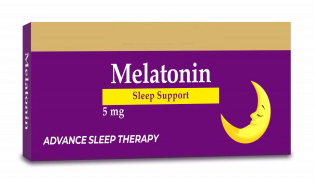Melatonin Supplements Can Cause Gut Inflammation And Increase Severity Of Crohn’s Disease And Ulcerative Colitis Depending On Microbiota Profile!
Melatonin Supplements - Gut Inflammation Jul 11, 2023 2 years, 5 months, 2 days, 4 hours, 58 minutes ago
Melatonin Usage Which Has Increased Due To COVID-19 Should Be Handled With Proper Due Diligence And Under The Supervision Of One’s Personal Physician
Melatonin Supplements: In an alarming discovery, scientists from Ribeirão Preto Medical School at the University of São Paulo-Brazil, have found a potential connection between melatonin, a widely used sleep supplement, and gut inflammation. This revelation has important implications for individuals suffering from Crohn's disease and ulcerative colitis.

The study findings shed light on the impact of
Melatonin Supplements on gut health and how it may influence the severity of these chronic inflammatory bowel diseases.
The Link Between Melatonin and Gut Inflammation
The study findings revealed that melatonin has the potential to disrupt gut health and contribute to the development of gut inflammation. The study team found that the effects of melatonin on the gut depend on an individual's microbiota profile. Microbiota refers to the trillions of bacteria and other microorganisms residing in our gut, which play a crucial role in maintaining overall health.
Melatonin and Crohn's Disease
Crohn's disease is a chronic inflammatory condition that primarily affects the digestive tract. It is characterized by symptoms such as abdominal pain, diarrhea, and weight loss. The study suggests that melatonin can exacerbate the severity of Crohn's disease, particularly in individuals with a specific microbiota profile. This finding highlights the importance of understanding an individual's gut microbiota composition before considering melatonin supplementation.
Melatonin and Ulcerative Colitis
Ulcerative colitis is another form of inflammatory bowel disease that causes inflammation and ulcers in the colon and rectum. The study findings also found that melatonin may also contribute to the worsening of ulcerative colitis, subjective to the microbiota profile of the individual concerned.
The Study
The study team evaluated the effects of melatonin in experimental colitis that evolves with intestinal dysbiosis, inflammation and bacterial translocation. C57BL/6 mice were exposed to dextran sulfate sodium and treated with melatonin. In acute colitis, the hormone led to increased clinical, systemic and intestinal inflammatory parameters. During remission, continued melatonin administration delayed recovery, increased TNF, memory effector lymphocytes and diminished spleen regulatory cells.
It was also found that melatonin treatment reduced Bacteroidetes and augmented Actinobacteria and Verrucomicrobia phyla in mice feces. Microbiota depletion resulted in a remarkable reversion of the colitis phenotype after melatonin administration, including a counter-regulatory immune response, reduction in TNF and colon macrophages. There was a decrease in Actinobacteria, Firmicutes and, most strikingly, Verrucomicrobia phylum in recovering mice.
The study findings pointed to a gut-microbiota-dependent effect of melatonin in the
potentiation of intestinal inflammation.
Implications and Future Research
The findings of this study have significant implications for individuals who rely on melatonin as a sleep aid or for managing circadian rhythm disorders and also for the many using it to prevent COVID-19 induced inflammation. While melatonin is generally considered safe, it is essential to be aware of its potential impact on gut health, especially for individuals with existing gastrointestinal conditions like Crohn's disease and ulcerative colitis.
Corresponding author, Dr Cristina Ribeiro de Barros Cardoso, a professor of immunology and neuroimmunoendocrinology at the University of São Paulo’s Ribeirão Preto School of Pharmaceutical Sciences (FCFRP-USP) told Thailand Medical News, “Melatonin is generally thought to be harmless. After all, it’s a hormone and can help regulate sleep. However, our study shows that people should be careful about taking hormone supplements and that the ingestion of melatonin supplements can have adverse effects on health.”
The research also highlights the importance of personalized medicine and the role of gut microbiota in determining individual responses to various therapies. Future studies should focus on elucidating the specific interactions between melatonin, gut microbiota, and inflammatory bowel diseases to develop targeted treatments that minimize the risk of gut inflammation.
It was noted that because of the study’s findings, ANVISA, Brazil’s national health surveillance agency, has recently updated its information and rules on the sale of melatonin as a food supplement, but even so control is looser than that for medications and prescribed pharmaceuticals.
Conclusion
The discovery of a potential link between melatonin, gut inflammation, and the severity of Crohn's disease and ulcerative colitis has opened up new avenues for research and understanding. As scientists delve deeper into this field, it is crucial for individuals with these chronic inflammatory bowel diseases to consult with healthcare professionals before incorporating melatonin into their treatment regimen. By considering an individual's microbiota profile, healthcare providers can develop personalized strategies that optimize sleep quality while minimizing the risk of exacerbating gut inflammation.
The study findings were published in the peer reviewed journal: Microorganisms.
https://www.mdpi.com/2076-2607/11/2/460
For the latest on
Melatonin Supplements, keep on logging to Thailand Medical News.
